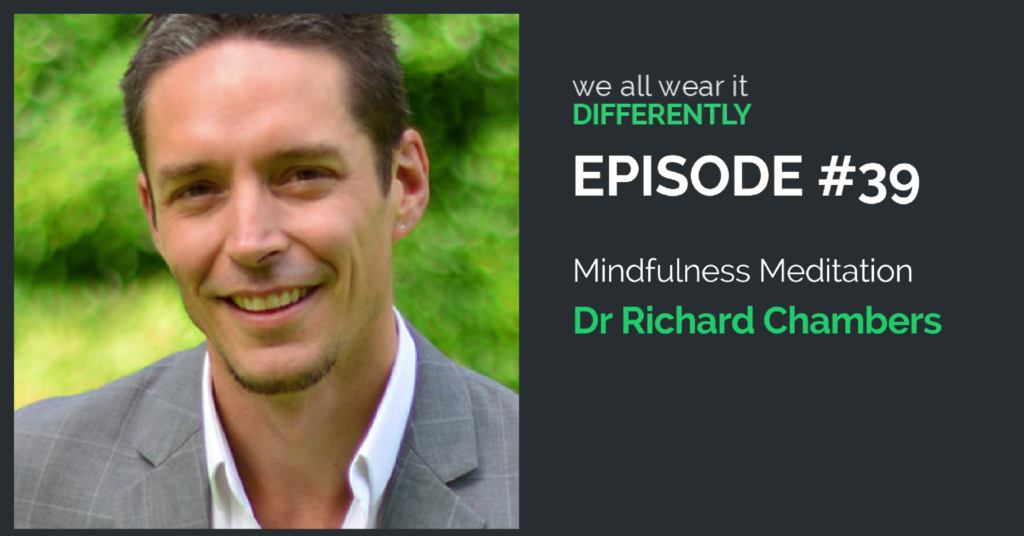#39 – Mindfulness Meditation with Dr Richard Chambers

Dr Richard Chambers is a clinical psychologist and internationally-recognised expert in mindfulness. He has authored books on the topic including The Art Of Mindful Origami and co-authored Mindful Learning and Mindful Relationships. Richard was one of the developers of Smiling Mind (mindfulness meditation app), and co-founder of recharge.
Richard provides clinical psychology sessions in his private practice for individuals and couples. These emphasise the transformative effects of mindfulness combined with a range of other effective, evidence-based therapies including CBT, ACT and Gottman Couple’s Therapy.
Richard also provides mindfulness presentations, workshops and courses for organisations and the general public that are designed to teach you how to be more present and engaged in every area of your life. He teaches mindfulness in a practical evidence-based way so it can be easily grasped and seamlessly integrated it into one's personal life or workplace.
At Monash University, Richards is leading an initiative to create the world’s first mindful university, embedding mindfulness in the core curriculum for all students.
For over 15 years Richard has helped a growing number of individuals, educational institutions, businesses, professional sporting teams and community organisations use mindfulness to improve their wellbeing and performance. He regularly feature in mainstream TV, radio and print media, discussing how mindfulness, wellbeing, productivity and positive psychology can enhance our lives.
Recommended Resources
Mindfulness courses and training
- The free 6-week Mindfulness for Wellbeing & Peak Performance online course (https://www.futurelearn.com/
courses/mindfulness-wellbeing- performance) offered through Monash University and Futurelearn is a great way to learn about the science and practice of mindfulness. Learn how to establish a meditation practice and how to apply mindfulness to reduce stress, improve productivity and performance, and enhance communication and relationships. - If people want to come and learn with me, my brand new popup meditation studio recharge (www.rechargemeditation.com.au
) is the way to do it. I offer 4-week introductory courses in beautiful warehouse settings around Melbourne. The course covers meditation, stress reduction, work/study performance, communication and relationships and mindful eating.
Books
- Full Catastrophe Living by Jon Kabat-Zinn is dense but is a classic and well worth a read.
- Mindful Meditation by Michael Bunting is one of the best books I have read on mindfulness meditation.
- The Mindful Child by Susan Kaiser-Greenland is great for understanding mindfulness for kids
- Radical Acceptance by Tara Brach is the best book I have read on heartfulness, and an all-time classic book in my opinion
- My books Mindful Learning and Mindful Relationships will be useful for psychologists.
- And The Art Of Mindful Origami is a great Christmas present (just saying!)
Online
- Mindful.org (online or via Facebook – a regular digest of the latest research and helpful articles)
- American Mindfulness Research Monthly (https://goamra.org) is a monthly digest of the latest peer-reviewed mindfulness research
- Richard's Website – www.drrichardchambers.com
Apps
- Smiling Mind (www.smilingmind.com.au) is a great free meditation app with 1.4 million downloads. Use it to guide your own practice, use it in sessions with clients, or contact Smiling Mind for additional free educational resources.
Feedback
Please leave Richard or myself a comment or some feedback, we’d love to hear from you and I’ll respond to everyone!
- # 63 – Paediatric Chronic Pain with Dr Nicki Ferencz - November 13, 2020
- # 64 – Chronic Pain with Sports and Exercise Psychologist Damien Stewart - November 11, 2020
- # 62 – Pain Management with Dr Jacqui Stanford - November 8, 2020

Wow! Thanks so much Amy and Richard. That was so interesting and Richard has really re-ignited my interest in mindfulness through his passion and easy explanations. I will be incorporating more mindfulness into sessions, particularly trying to use the experiential approach.